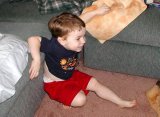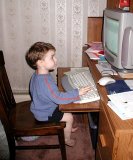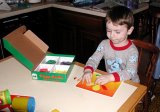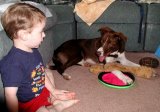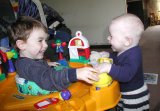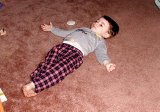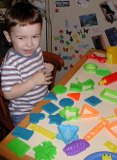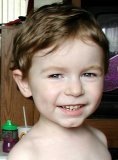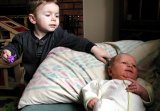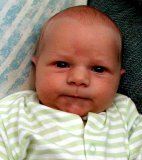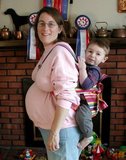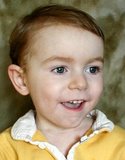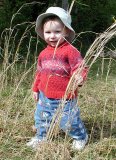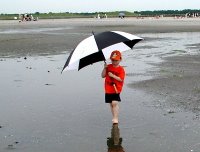The photo thingy still appears to be non-functional. I promise I'll come back and post photos when it's possible to do so! Would be terribly boring to just have all these words without any cute faces to look at, wouldn't it?
So, on to year 2. Jacob's first birthday came and went, with him eating his very first piece of cake like a pro, without a single crumb going astray. Which was nice, given that he was very upset by anything messy. His second year was more difficult than his first. Bigger discoveries in an expanding world for him made for bigger upsets and more obvious difficulties. Yet still we didn't suspect a thing -- he was hitting his milestones in a timely enough fashion that it jived with the Pediatrician's little checklist, and any question we had about ANYTHING seemed to be dismissed with a condescending chuckle and a wave of the hand.
Several things of interest to note about this year:
He was growing increasingly uncomfortable with people looking at him. Any direct eye contact from another person was met with Jacob burying his head into my shoulder and freezing in position like a deer caught in the headlights. With us we felt that he had fairly decent eye contact, but anyone other than his parents and a few select favored adults were met as though he couldn't even bear to look at them.
At 17 months I took him to see a Homeopath (who, ironically, specializes in Autism). I can't put my finger on a reason as to WHY I took him, I just felt like it was a good idea (I am a huge believer in Homeopathy, a topic I am sure to write more on as we progress with this story). Even though Jacob couldn't do anything but the freeze-while-attached-to-my-breast act, and I don't think the Homeopath ever even saw Jacob's face, he declared him to be the healthiest child he'd ever seen and not in need of any specific care. He sent us on our way with a general remedy, a pat on the head, and a bill for his services. (Special note: Jacob did later recieve great benefit from a Homeopath, so they aren't all completely useless!)
At 18 months Jacob began speaking in long, perfectly pronounced sentences. Prior to this he had done the usual amount of babbling (or so I assume, I honestly am not sure what "usual" is!), and had a few clear words with meaning (dog, mommy, daddy, hi, cookie). But he seemed to wake up one night speaking in paragraphs. However, this was strictly in scripted sentences. Video scripts, to be precise. Full episodes of Kipper (with a British accent, of course). Recitations of entire scenes from Blues Clues. For months we had live Finding Nemo theater, complete with hummed theme music. He was a regular one-man show, and we joked about charging admission and opening a dinner theater. Yet, oddly enough, nobody seemed to think this was out of the ordinary. At least, nobody told US that it was out of the ordinary. Everyone marveled at what a wonderful memory he had. He had absolutely no conversational ability, but nobody seemed concerned about that. The Pediatrician only wanted to know if he knew at least 25 different words and spoke in sentences at least 3 words long. Um, yeah.
Around that same time, Jacob began obsessing over letters and numbers. He already knew his shapes and colors by heart, having caused his aunt's heart to skip a beat or two when he properly identified a pentagon by name. He knew the alphabet, upper and lower cases, by sight before his 2nd birthday. He also could spell his name, along with certain other simple words like cat, dog, and cow. He could recite numbers beyond 100, and as far as we could tell, could count actual objects just as far. All this admittedly freaked us out a bit, as we did nothing to actually work on this with him, he just sort of picked it up somehow.
What we later learned is called "Perseverative Behavior" (or perseverations) became obvious. This means that he would do the same thing over and over and over ad naseum. One particularly memorable, yet very typical, example of this -- one of our old cats became gravely ill and Jacob and I spent the better part of an afternoon at the vet's office having tests run, trying out emergency treatments, and eventually making the decision to humanely end the cat's discomfort. Needless to say, it was an emotionally packed visit, in a small room with nothing to occupy a child's interest. Yet Jacob, about 20 mos at the time, contentedly stood by a row of chairs opening the door to the empty cat carrier, placing a brochure for pet tags inside, closing the door, opening the door, removing the brochure, closing the door, and repeating. For 2 1/2 hours.
With the perseverations came new challenges. Shopping with him on foot became impossible -- he would decide to attach and detach a display hook for hours, having an emormous meltdown if I tried to remove him, carrying him kicking and screaming from stores, attracting a whole lot of looks, both the sympathetic type, and the "can't you control that child" type. I started avoiding stores that did not provide carts, and in those stores that did, I first ran to find something inexpensive that I didn't mind buying for him to play with while I shopped (because he wouldn't be "done" with it by the time I was done shopping, and taking it away from him would cause the end of the world as we knew it). I learned to buy multiples of his favorite items, for fear that we might lose that one beloved item someplace and cause the earth to stop turning for him.
At some point before his 2nd birthday it suddenly occured to us that he didn't know how to climb. Anything. Even low lying obstacles. So we instantly enrolled him in Gymboree classes and started taking him around to the smaller local parks and playgrounds. Gymboree was a great experience, as long as we dedicated the better part of the morning to it, as there were toys in the waiting room that had to played with for a certain amount of time both before and after class. During class, he would choose one of the many potential play surfaces to obsess over, and would do it over and over for the entire class. But the class design was pretty loose anyway, and the teachers very tolerant of kids doing their own thing at their own pace, so the only remaining obstacle was the rest of the parents' patience if their kid actually wanted to use whatever it was that Jacob chose that day. And he DID learn to climb, and at an age that the Pediatrician obviously found acceptable.
The parks and playgrounds became a testing ground for the limits of my patience. I'm pretty much a borderline hyperactive on-the-go, overscheduled-and-love-it, bite-off-more-than-you-can-chew-then-take-another-bite sort of person. Jacob's approach to the playgrounds was more like a pace that would bore a snail. First he would stand just on the outskirts of the play area and study every possible place to sit. After 10 or 15 minutes, he would decide on the best vantage point from which to study the rest of the playground, and plant himself there for the next hour or so, not really looking at anything in particular, more just soaking in the atmosphere and becoming one with the playscape. Just about the time I thought I would start pulling out my hair, he'd stand up and choose the item he wanted to perseverate on that day -- maybe a ladder to climb up and down the first step of a thousand or so times, or a steering wheel to turn 3 times to the right, then back to the left 4 times, then once more to the right, before walking away a step, returning, and repeating a hundred times, more or less. After a couple hours of that, he sometimes would leave the playground willingly. Sometimes it was more kicking and screaming and yelling and crying (and not all the tears were his....). I marveled at those amazing families that appeared and dissappeared during our playground stay -- mom: "ok, kids, just a couple of minutes" kids: "ok mom!" and then down a few slides, across the monkey bars, and then the truly magicaly moment, where mom called out "alright, time to go" and the kids skipped along after her to the car. HOW does she DO that?!?!?! It was much more mysterious to me than any Agatha Christie novel had ever been!
We had some agonizingly awful moments, when some major meltdown over apparently nothing (or something so minor that it's significance failed to impress me) left me standing there with a blank look on my face, powerless to even attempt any sort of repair. But for the most part, I spent the year learning how to manage Jacob's life so that those moments happened less and less. By the time he turned 2, I had a pretty good routine worked out where we avoided crowds, only went into public when fully contained and entertained, and spent a lot of time sitting on my butt at playgrounds waiting for him to indicate his ability to move on.
I figured I had this whole Mommy thing pretty much under control.
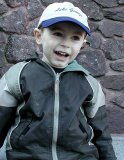 We purchased a video camera when Jacob was 18 months old -- I was pregnant with Zoo Boy at the time and we just knew that we would want to be capturing both of our boys growing up. I had lots of 30-second snippets on my digital camera, and thought how great it would be to get larger chunks of my kids' lives on film for posterity.
We purchased a video camera when Jacob was 18 months old -- I was pregnant with Zoo Boy at the time and we just knew that we would want to be capturing both of our boys growing up. I had lots of 30-second snippets on my digital camera, and thought how great it would be to get larger chunks of my kids' lives on film for posterity.
